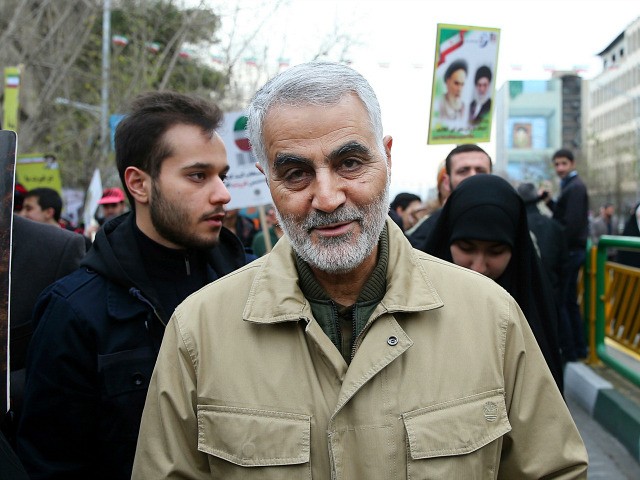New York Times reporter Farnaz Fassihi promoted propaganda created by Iran’s Islamic Revolutionary Guard Corps (IRGC) on Friday following the Pentagon confirming that it had killed General Qasem Soleimani, who commanded the IRGC’s Quds Force.
“Breaking: Unconfirmed reports of ballistic missiles hitting largest US military base Ain Al-Assad in #Iraq & massive explosions, via IRGC Telegram channels,” tweeted Fassihi on Friday afternoon, spreading false reports apparently bolstered by “IRGC Telegram channels.”
The U.S. government branded the IRGC a foreign terrorist organization in April. The Quds Force is an international IRGC unit that specializes in terrorist bombings and colonization efforts. Under Soleimani, the Quds Force expanded its reach in Syria, Yemen, Iraq, Lebanon, and parts of Latin America.
Other journalists accused Fassihi of spreading “fake news” after confirming with those at the Ain Al-Assad base that nothing of the sort was going on there and the Telegram images Fassihi referred to were from years ago.
About an hour later, Fassihi posted an “update,” alerting her followers that her previous tweet was false.
“Update: These reports of attacks on US base are not true according to Iraqi military officials,” tweeted Fassihi.
Her initial tweet – which has garnered nearly 2,000 “likes” and “retweets” – has not been deleted.
Moreover, during the early hours of Friday morning – amid reports that the U.S. military had successfully killed Soleimani – Fassihi bizarrely tweeted a video of the Quds Force commander reading poetry, which she described as “rare” and “personal.”
“Rare personal video of Gen. Suleimani reciting poetry shared by a source in #Iran. About friends departing & him being left behind,” said Fassihi in her tweet, which included the video.
The video resulted in the NYT journalist coming under scrutiny by users on social media.
“Showing the soft side of a terrorist who killed and maimed thousands of people also shows the true colors of the New York Times,” said one user on Twitter.
“Thoughts and prayers to you and your family at this time of sorrow,” quipped another.
Fassihi reacted to the criticism by doubling down and defending her decision to post the video.
“Folks attacking me for sharing this video: It’s called reporting. It’s not an endorsement or sympathy. I share whatever info I get for all to see. That’s all,” said Fassihi, which elicited a plethora of new replies.
The U.S. military, at the direction of President Donald Trump, eliminated Soleimani in airstrikes in Baghdad early Friday morning in what was a huge blow to the Islamic Republic. Washington has since confirmed that Soleimani had orchestrated the failed siege of the U.S. embassy in Baghdad last weekend and was planning imminent attacks on American citizens.
Soleimani is believed to have been responsible for at least 500 American deaths and thousands of casualties.
You can follow Alana Mastrangelo on Twitter at @ARmastrangelo, and on Instagram.

COMMENTS
Please let us know if you're having issues with commenting.